
Roux
Definition: a cooked mixture of flour and fat used as a thickening agent in a soup or a sauce
Roux is a shortening of beurre roux, which in French translates as "brown butter." The plural of the word is spelled the same as its singular form but is pronounced \ˈrüz\.
To use flour for thickening, you’ll first need to make a roux—an equal mixture of flour and melted butter. Melt the butter in a skillet and then add the flour. Mix it well and let it cook until it turns brown. You can then add the roux to your sauce and stir the contents well while it cooks.
— Lauren Paige Richeson, The Manual, 10 Mar. 2021
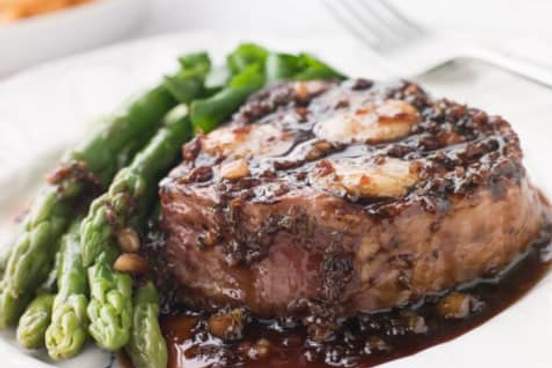
Bordelaise
Definition: a sauce consisting of stock thickened with roux and flavored typically with red wine and shallots
The etymology of bordelaise is tastefully simple: bordelaise is the feminine form of the adjective bordelais, meaning "of Bordeaux" (a region in France famous for its wines).
My favorite dishes include … rack of venison in a rich Bordelaise sauce made from shallots, herbs, butter and a red wine reduction….
— David Cohen, The Press-Enterprise (Riverside, California), 2 Oct. 2020

Velouté
Definition: a soup or sauce made of chicken, veal, or fish stock and cream and thickened with butter and flour
The etymology of the name for this comforting, creamy, thick soup or sauce makes it a perfect choice. Velouté, in French, means "velvetiness" or "softness." It is related to velours, which gave English velour, a word for velvety material. Both the food and fabric are sure to please the senses.
While velouté is a flavorful sauce in its own right, often served over poached or steamed fish or chicken, it's also often used as a building block to gravies and other mixtures like bisque or pot pie. It starts with a white roux, and is then mixed with a light stock from fish, chicken, or veal, making it an easy addition to rich-in-flavor recipes.
— Bon Appétit, 26 Nov. 2018
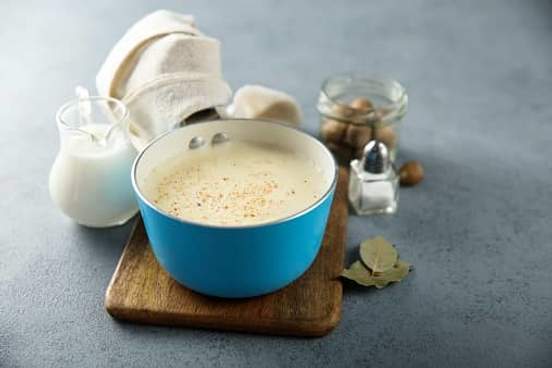
Béchamel
Definition: a rich white sauce
This thick white sauce was invented by, and thus named after, Louis de Béchamel, a French courtier who served in the court of Louis XIV. Béchamel died in 1703, but it did not take long for his sauce to become part of the culinary and linguistic landscape.
Bechamel is one of the 5 "mother sauces" from the French cuisine. It's essentially a white sauce and starts by making a roux. The whole process is similar to making white gravy (just without the sausage). By warming the milk before adding it to the roux, your mixture will come together more easily.
— Makinze Gore, Delish, 4 Jan. 2021
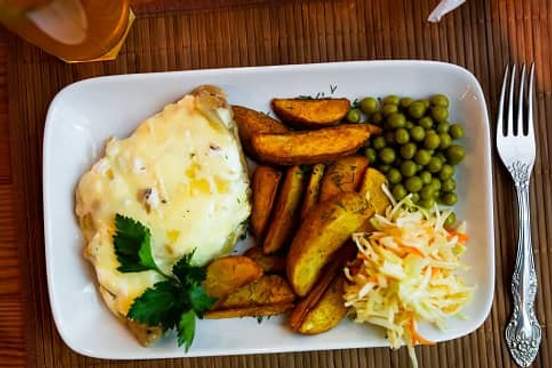
Soubise
Definition: a garnish or white sauce containing onions or onion purée
Soubise is said to be named after 18th-century French nobleman Charles de Rohan, Prince de Soubise, a favorite of Louis XV and Madame de Pompadour.
... the soubise sauce—a simple French recipe based on béchamel, but using onions. I've caramelised the onions for an extra hit of flavour.
— Adam Liaw, Good Food (Australia), 5 Sept. 2016

Braise
Definition: to cook slowly in fat and a small amount of liquid in a closed pot
The verb braise is from French braiser and braise, both of which signal that the coals are hot. The likely ignitors of the French words are Germanic kindling along with the Swedish brasa, meaning "fire."
Braise when your goal is deep levels of flavor and soft, melty caramelized texture. Braising works beautifully on all cuts of meat, even lighter ones like chicken, but the cooking technique especially benefits the tough cuts, like beef brisket. Braising tenderizes meat, dissolving collagen and connective tissue into gelatin (which makes for a richer sauce or gravy later on) and coaxing flavor through every meat fiber until it's fork-tender.
— MasterClass.com, 8 Nov. 2020
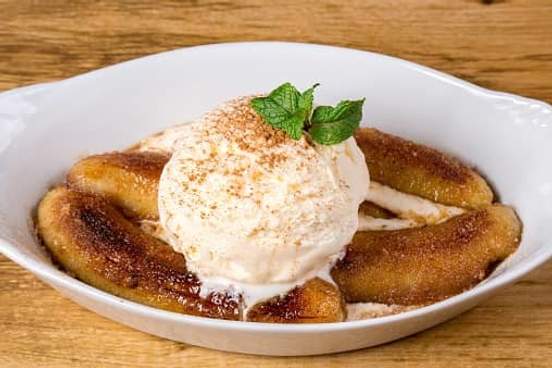
Flambé
Definition (adjective): dressed or served covered with flaming liquor (such as brandy, rum, or cognac) — usually used postpositively, as in "crêpes suzette flambé"
Definition (verb): to douse with a liquor (such as brandy, rum, or cognac) and ignite
Flambé is the past participle of French flamber, meaning "to flame or singe," which is derived from the Old French noun flambe, meaning "flame." The é is followed by -ed or -ing in inflected forms of the English verb: "The crepes are flambéed with brandy." In the following example, the participle functions as an adjective.
Think, for example, of the way it feels when the marshmallow you have been meticulously roasting over a campfire accidentally catches. There’s a moment of pure thrill, an instant of terror, then you blow it out and eat it anyway. Some people even do this on purpose, chasing the fleeting moment when sugar and flame become one, the bittersweet flavor of char. A flambéed dessert takes this feeling and amplifies it in two ways: with the addition of alcohol, and with the move to the indoors. Setting your marshmallow on fire outside is one thing, but a flaming dessert served indoors takes the thrill to another level. It feels a bit more dangerous, almost illicit.
— Carina Finn, Eater, 15 Dec. 2020
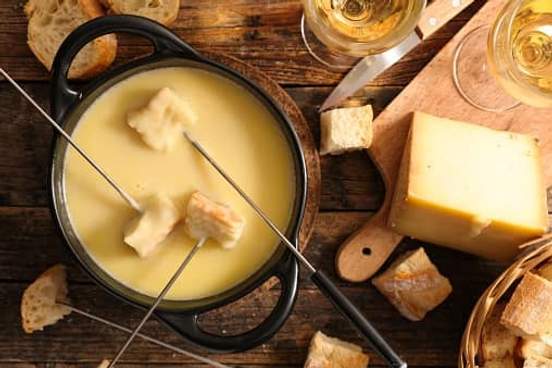
Fondue (or Fondu)
Definition: a dish that people prepare for themselves at the table by putting small pieces of food (such as bread, meat, or fruit) in a hot liquid (such as melted and flavored cheese or melted chocolate)
Originally, fondue named a dish that is similar to the egg-based soufflé and that is usually made with cheese and bread crumbs; however, it is most familiar as the name for a preparation of melted cheese usually flavored with white wine and kirsch (a type of brandy), or a dish that consists of small pieces of food that is cooked in or dipped into a hot liquid. The name is a French derivative of the verb fondre, meaning "to melt or cast." Another food name related to fondre is fondant, which refers to a sugary preparation that is used as a basis for candies or icings.
If you are planning a large fondue dinner party, you can serve the fondue buffet style. Cheese fondue works particularly well for larger groups. The fondue pot can be placed in the center of the dining room table on a heatproof mat or baking stone, with other appetizers nearby. Guests can come up to the table to dip and dunk cubes of French bread and vegetables into the delectable, creamy cheese fondue and sample some of the other appetizers, [IIlana Simon] said.
— The Times Leader (Wilkes-Barre, Pennsylvania), 22 Dec. 2007

Hollandaise
Definition: a rich sauce made basically of butter, egg yolks, and lemon juice or vinegar
In French, sauce hollandaise means "Dutch sauce." Its name is from Hollande, the French designation for Holland.
Hollandaise sauce, famous for its use on eggs Benedict, is more difficult than tomato, bechamel, or velouté sauce because it involves eggs. Eggs are temperamental when exposed to heat, which leaves little margin for error and zero room for correction if the process goes awry. The basic requirements for making hollandaise sauce are egg yolks, lemon juice, melted butter, and salt.
— Influencive.com, 1 Mar. 2021

Béarnaise
Definition: a sauce of egg yolks and butter flavored with shallots, wine, vinegar, and seasonings
There is no secret to the name of this sauce. Béarnaise is based on Béarn, a region and former province of southwestern France, where it was originally prepared.
Béarnaise sauce is a piquant child of hollandaise, one of the so-called mother sauces of French cuisine. It is simply an emulsification—egg yolks and butter cut through with vinegar flavored with tarragon and shallots, with a bite of black pepper. Think of it as a loose mayonnaise, requiring only plenty of whisking and a careful hand with the heat to master. ... Apply the sauce to steaks or burgers, asparagus or salmon.
— Sam Sifton, The New York Times, 31 Jan. 2017

Mousseline
Definition: a sauce (such as hollandaise) to which whipped cream or beaten egg whites have been added
Mousseline is the name for a soft, light sauce as well as a fine, sheer fabric that resembles muslin. It is also a synonym of mousse in its sense referring to a light, spongy food. In French, mousse can mean "froth" or "moss."
Made with egg yolks, clarified butter and lemon, this sauce is not for the faint of heart, but those who persevere are rewarded with a rich and decadent topping for just about anything, from proteins to vegetables. Making Hollandaise uses emulsification, with an egg yolk as the binding agent. Patience and proper technique are required, so the eggs do not curdle. Take it up a notch: Instead of lemon juice, make a Béarnaise sauce by using white wine vinegar. Add shallots and tarragon. Or make a mousseline by adding unsweetened whipped cream.
— Genevie Durano, The Las Vegas Weekly, 23 Apr. 2020
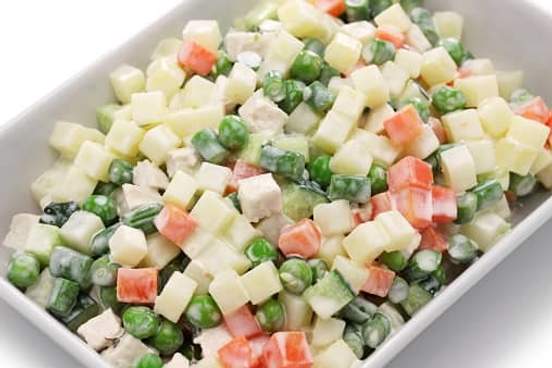
Macédoine
Definition 1 : a confused mixture 2 : a mixture of fruits or vegetables served as a salad or cocktail or in a jellied dessert or used in a sauce or as a garnish
Macédoine is the French name for Macedonia, a region on the Balkan Peninsula that is now part of Greece, the Republic of North Macedonia, and Bulgaria. Historically, this area has been home to a richly varied population encompassing many ethnic groups. Etymologists believe that the cultural heterogeneity of the region may have inspired people to use its name as a generic term for any kind of wildly jumbled mixture, including that of the foods used in some sauces.
For dessert, we had a fancy little frozen chocolate mousse wrapped in a thin layer of striped cake, which was good, but I liked the simplicity of the ginger cake better. Not like gingerbread, more like a pound cake enhanced with fresh ginger. It was surrounded by a classic macedoine of strawberries with basil.
— Polly Campbell, The Cincinnati Enquirer, 20 June 2018
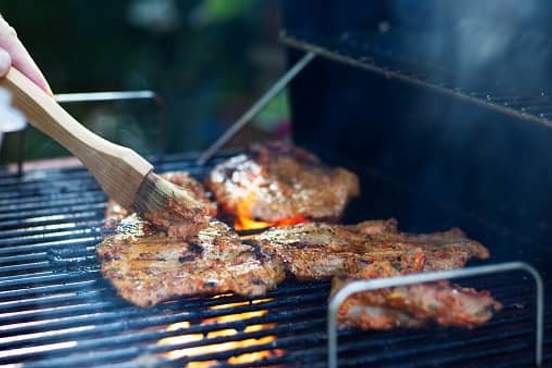
Marinade
Definition: a savory usually acidic sauce in which meat, fish, or a vegetable is soaked to enrich its flavor or to tenderize it
The main ingredient of marinade is French mariner, meaning "to pickle" or "to marinate." The verb marinate refers to steeping foods in a marinade or to coating or covering food with tasty herbs, spices, etc., before cooking. Marination is the name of the process. Whereas marinade and the older marinate could be found in 18th- and 17th-century cookbooks, respectively, marination doesn't appear in recipes until the 20th century.
A marinade is the cooking equivalent of self-care, a step that's unnecessary, but glorious. Especially with lean cuts that are lacking in personality and prone to drying out, a good marinade boosts flavor and tenderness to infinity and beyond.
— Emma Laperruque, Salon, 3 Apr. 2021

Mayonnaise
Definition: a dressing made chiefly of egg yolks, vegetable oils, and vinegar or lemon juice
The etymology of mayonnaise is as basic as the condiment's ingredients: it is a French word of unknown origin. The lesser-known, similarly-spelled lyonnaise play means "prepared with onions" and gets its name from its birthplace of Lyons, France.
Lyonnaise Potatoes (sliced potatoes cooked with onions) are as beautiful as the name. Sticky, caramelized onions fried alongside golden crispy potatoes, and topped with buttery garlic and parsley.
— The Lewis County (Tennessee) Herald, 4 Mar. 2021

Puree (or Purée)
Definition: a paste or thick liquid suspension usually made from cooked food ground finely
Puree was processed from Middle French purer, meaning "to cleanse" or "to strain vegetables," which itself was made from Latin purare, meaning "to purify." Besides a pasty food, puree is a thick soup of smooth texture.
I bet you can find nettles. Pick them now (wearing rubber gloves) while they are young, strip off the leaves and then cook to a rich green purée. It's delicious with lamb and so full of nutrients they ought to be called a superfood....
— Xanthe Clay, The Daily Telegraph (London), 27 Mar. 2021

Rouille
Definition: a peppery garlic sauce
In French, rouille means, literally, "rust." The reddish-brown Mediterranean sauce is usually served with fish soups and stews.
It was a desire for rouille (pronounced roo-EE) that made me summon my courage. I was reminiscing with my mother about trips to Southern France. I loved when she would order a thick, rich fish soup that was served with croutons, grated cheese and a bowl of garlic-imbued rouille. She sipped the soup while I dunked the croutons in rouille and cheese.
— Melissa Clark, The New York Times, 28 Aug. 2009

Mignonette
Definition 1 : a type of herb 2 : a sauce made typically with vinegar, pepper, and herbs and served especially with oysters
Here's an illustration of the herb mignonette (which is not used in the sauce). Its name stems from French words meaning "dainty" and "darling." Those adjectives perfectly describe the small, delicate flowers of the plant, and dainty is fitting for the dollops of the piquant sauce placed on oysters. However, in French cooking, mignonette is used for a mix of ground peppercorn, dainty berries of the black pepper plant, and this is the likely source for the sauce's name.
Here, oysters sourced from small farms ... are expertly shucked and presented with a “dealer's choice” mignonette, like the bright, slightly spicy jalapeno mignonette on my visit, light years ahead of clumsy red wine vinegar/shallot or even onion styles I see all too often.
— Stephanie Burt, Saveur, 29 Jan. 2021





